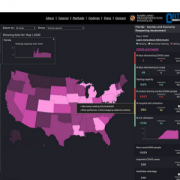New Data Shows States Not Meeting Reopening Benchmarks
 Despite mounting pressure to reopen, states are still struggling to meet the criteria for safely lifting restrictions meant to contain COVID-19, University of Maryland (UMD) researchers have found.
Despite mounting pressure to reopen, states are still struggling to meet the criteria for safely lifting restrictions meant to contain COVID-19, University of Maryland (UMD) researchers have found.
Not a single state has met all six public health gating criteria or seen a sustained decline in COVID-19 cases, and most continue to lack sufficient testing capacity and contact tracing workers, according to the research. The six gating criteria include those set by the White House, the Centers for Disease Control (CDC), and the World Health Organization (WHO).
The findings are drawn from a new Society and Economy Reopening Assessment (SERA) tool, developed by a multidisciplinary team of epidemiologists, public health experts, economists, and mobility and social distancing researchers led by UMD’s Maryland Transportation Institute. The tool provides state and county-level data on social distancing, testing capacity, hospital bed and ICU utilization, contact tracing, COVID case trends, and the number of COVID cases being brought in by travel across state lines, among other factors.
In addition, SERA measures economic factors such as the unemployment rate, consumer behavior and consumption reduction, and the number of people working from home.
As of May 7-8, 2020, the SERA tool has produced the following assessment results:
- No state has passed all six public health gating criteria.
- No state has observed more than 14 days of decreasing COVID cases.
- Most states do not have enough contact tracing workers or sufficient technology that can allow their current contact tracing workers to effectively trace all new cases.
- 21 states do not have sufficient testing capacity as shown by high positive test rates.
- All states, except NY and NJ, have unused ICU beds available for COVID-19 patients, but in 23 states the utilization rate is above 50%, potentially leaving them without sufficient capacity to accommodate a surge in cases.
- Partial reopenings have produced 4.6 million more out-of-state trips per day that cross state borders in the U.S, potentially causing new outbreaks. Top 10 states with the most increases in out-of-state trips are GA, PA, NC, AL, SC, TN, IL, MD, FL and VA.
- Between 4/23 and 5/8, the social distancing index dropped by 13 points nationwide, the percentage of people staying home dropped by 19%, the number of non-work trips increased by 16%, and distance travelled increased by 21% nationwide. Top 10 states with the most reduction in social distancing behavior are GA, AK, SC, MI, AL, WA, UT, MO, IN, and ID.
“SERA provides a comprehensive picture of each state and county’s readiness to reopen,” said MTI director Lei Zhang, who is leading the project. “SERA shows how their situation changes over time, ranks in the nation, and compares to established reopening gating criteria.”
Information like this is essential to sound decision-making, Zhang said. And it’s also a boon for members of the general public. “Reopening has become a politically charged issue,” he said. “Now everyone can go directly to SERA, assess reopening readiness in their state and county, and learn what more needs to be done for safe and responsible reopening. Our platform is accessible to everyone with comprehensive, timely, and easy-to-understand data.”
The SERA tool is part of an interactive data analytics platform, developed by MTI in partnership with the Center for Advanced Transportation Technology Lab. Since its launch on April 13, the platform has tracked a wide range of trends related to COVID-19, including levels of compliance with shelter-in-place orders and drops in social distancing behavior after partial reopenings.
The Maryland Transportation Institute and Center for Advanced Transportation Technology Laboratory are part of the Department of Civil and Environmental Engineering at UMD’s A. James Clark School of Engineering. For more information, visit the platform data.covid.umd.edu or to contact the project team at data-covid@umd.edu or call 410-245-8959.
Top